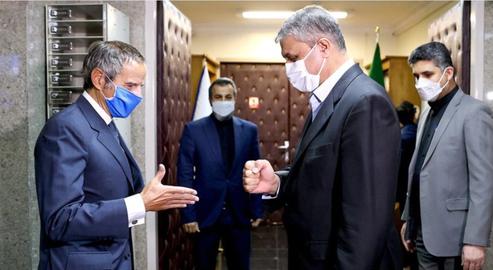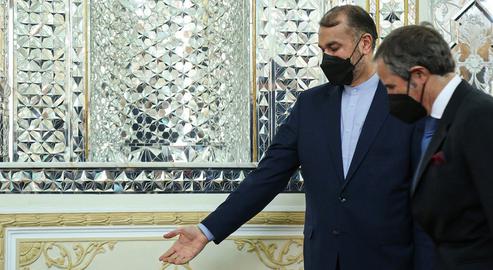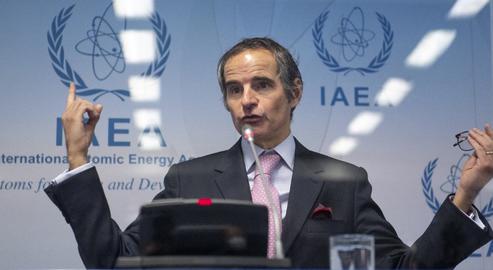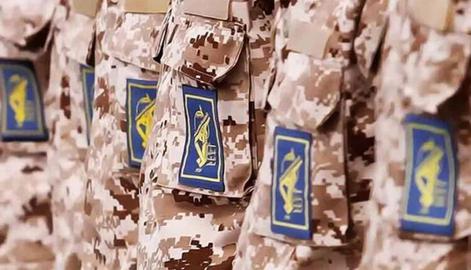The Director-General of the International Atomic Energy Agency (IAEA) said his visit to Tehran earlier this week – in the middle of the meeting of the IAEA’s Board of Governors, and before the resumption of nuclear talks between Iran and the United States – bore no results and failed to secure fresh access to Iranian nuclear facilities for IAEA inspectors.
Rafael Grossi's visit to Tehran began hours after the start of a quarterly meeting of the IAEA Board in Vienna, which Grossi was due to attend as Director-General. Travelling to Iran at such a moment shows the heightened tensions between the IAEA and the Islamic Republic. In Iran Grossi met with Mohammad Eslami, vice-president and chief of the Atomic Energy Organization of Iran, and Foreign Minister Hossein Amir Abdollahian.
Grossi’s tone – as well as that of his Iranian hosts – made it clear that no agreement between the IEA and Iran was in sight. On his return from Tehran, Grossi, in a direct and somewhat unprecedented statement, rejected remarks by Eslami, who had claimed that he had agreed with the IAEA to put aside some questions from Iran.
Grossi’s latest report, submitted to the IAEA’s 35 member-states a week before the start of the board meeting, once again expressed concern about hindrances to the IAEA’s ability to properly monitor Iran’s nuclear program inside the country. The report said Iran enriched uranium reserves to levels of 5, 20 and 60 percent enrichment. Grossi’s report also said that questions remained over the origin of uranium discovered in secret Iranian nuclear facilities.
The Board of Governors must respond to Grossi’s report by the end of this week's meeting. Indirect talks between the Islamic Republic and the United States, in Vienna, are then scheduled to resume to try to revive the JCPOA nuclear agreement. The IAEA’s reaction to Grossi’s report will affect the atmosphere of the talks and their possible outcome.
Grossi visited Tehran in the hopes of resolving disputes. He met with the head of the Atomic Energy Organization at his own request as well as with the Foreign Minister.
Eslami said after the meeting that the two sides had agreed to keep talking – implying that the main differences remain unresolved and that the Director-General's request for the resumption of monitoring in Iran had not been granted.
While IAEA chiefs usually meet with the Iranian president during their visits to Tehran, Grossi left without meeting with President Ebrahim Raisi, saying that he would give a press conference on the visit at Vienna airport. The conference was then postponed – showing that talks between the two sides continued even after Grossi's visit and that he postponed probably in the hopes of still reaching an agreement with Iranian officials.
But 14 hours after his return, Grossi finally gave his news conference at which he said the talks had been fruitless. He added that he expected the Islamic Republic to be asked to return to full cooperation with IAEA inspectors because the IAEA could not guarantee that it was aware of all of Iran's nuclear activities.
Grossi lamented the lack of security provided for IAEA inspectors in Iran in recent months. At least one female IAEA inspector has reportedly been harassed in Iran during recent missions.
Word later leaked that the Islamic Republic had offered Grossi permission to re-install IAEA surveillance cameras at the Karaj nuclear facility, which builds uranium enrichment equipment, and to insert new memory cards into the old cameras. But Iran's condition is that, in return, the IAEA drops its questions about the origin of the uranium discovered in some secret facilities and to close that part of its files.
Iran-IAEA relations have returned to the tensions and conflicts of the 2000s and 2010s. But in the meantime the reaction of the Board of Governors is decisive. The board can issue a resolution imposing requirements such as forcing inspections on Iran – something Iran will not be willing to do.
Related coverage:
The IAEA Nuclear Impasse: Five Questions Tehran Needs to Answer
IAEA Accuses Iran of Stonewalling its Investigations
Nuclear Acceleration and Rocket Attacks: The Uncertain Future of the JCPOA
Uncertain Future for Nuclear Deal as Rouhani’s Presidency Comes to an End
What Do We Know About the Nuclear Watchdog’s Cameras in Iran?
US Envoy for Iran: Tehran May Never Come Back to the JCPOA
What Will 60 Percent Nuclear Enrichment Do to Iran’s Future?
Zarif's Book, Part IV: The Behind-Closed-Doors Nuclear Shouting Match
Zarif's Book, Part III: Mohsen Fakhrizadeh's Role in the Nuclear Talks Revealed
visit the accountability section
In this section of Iran Wire, you can contact the officials and launch your campaign for various problems



























comments